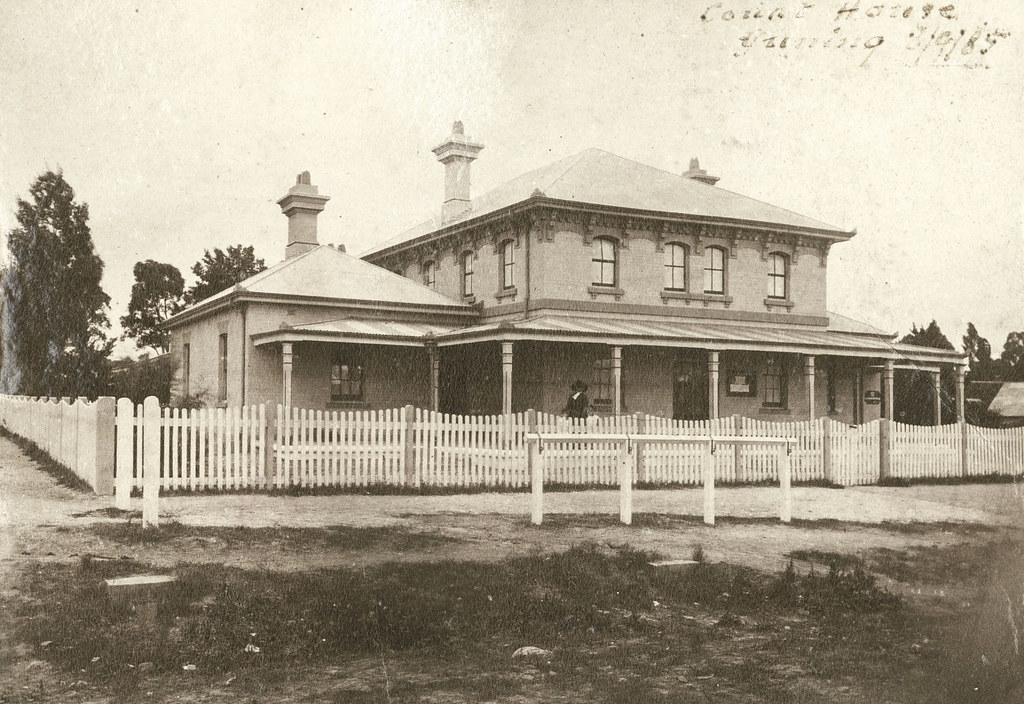 |
| Gunning Court House 1885: Photo via Flikr, State Library of NSW, Public Domain |
CONCERT
A concert was held according to advertisement at the court house last Friday evening in aid of the local cricket club. The audience was not as large as had been anticipated, but all the best class of people in the town were present, and the general deportment of the audience was by far better than at any other entertainment I have ever attended in Gunning. Either the larrikin element was absent or else our larrikins have reformed and learned to comport themselves as gentlemen. The entertainment passed off smoothly without a hitch, and those present were very enthusiastic in expressions of enjoyment.
J. F. Kenyon Esq. J.P., president of the cricket club, presided.
The entertainment was opened with a pianoforte solo by Miss James, which was very ably rendered. This young lady, who has been far from well for some time, was unable to sing, but notwithstanding severe indisposition, rode into town and rendered great assistance at the instrument.
Mr. C. Newman next sang My Grandfather's Clock. This popular song was well rendered and brought down the house.
Miss Barber then sang Yesterday. This young lady has an exquisite mezzo-soprano voice over which she has full command ; but her singing is too well known here to need praise.
Mr. W. P. Rowland followed with Nil Desperandum. This gentleman has hitherto been a stranger to us as a public singer, and the excellence of his performance was a pleasant surprise for those present. His voice is well calculated for filling a large room like the courthouse. I augur that he will hereafter be in great demand for amateur concerts.
Mr. C. Grovenor then rendered the ballad Never Give In. This young gentleman has always shown himself willing to assist at local concerts and is fast making his mark as one of our best amateurs.
Miss Newman then gave a song entitled Good-by at the Door. Miss Newman has a very sweet voice, but it is hardly strong enough to fill a room of the size.
The next piece was a duet entitled Woodland Whispers, played by the Misses Grovenor. The time throughout was perfect, and the general execution would have reflected great credit on adult pianists. The two little girls were greeted with quite a storm of applause at the conclusion of their performance.
A song by Miss McLeod, 'Tis Folly to Remember, completed the first part of tile programme. Miss McLeod renders her selections very well, and will doubtless gain confidence and improve as she grows older.
The second part of the programme was opened with an overture by Miss James, followed by a comic song from Mr. C. Newman called Another Good Man Gone Wrong. Miss McLeod was next with What Should Make Thee Sad, My Darling?
The next thing, which proved to be the gem of the evening, was a duet by Miss Barber and Mr. C. Grovenor. I did not ascertain the name of this duet, but it was sung in dialogue, each verse being set to some different popular air. Up to this time none of the performers had responded to encores, although in nearly every instance the applause had been hearty and long-continued, but this time they were not to be refused, and the singers finally responded, giving another very pleasing duet for which they were again heartily applauded.
The following songs followed:-- The Englishman, by Mr. Rowland (who in this and the next song that he rendered fully sustained the reputation that he made for himself at first). Threads of Silver, by Miss Newman; Jeremiah, by Mr. C. Newman ; Castles in the Air, by Miss Barber; and Britannia Rules the Wave, by Mr. Rowland.
Mr. Kenyon then thanked the audience for their attendance, and conveyed the thanks of the club to the performers who had so kindly given their valuable aid in making the concert a complete success.
All rose and joined with the singers in one verse of the national anthem and then dispersed to their homes satisfied that they had attended the best amateur concert held in Gunning.
The piano used on the occasion was kindly lent by Mrs. F. J. Lawliss.
The above article appeared on page 2 of the Goulburn Herald and Chronicle on Monday 19 January 1880. View the original article on Trove.
Comments
Post a Comment